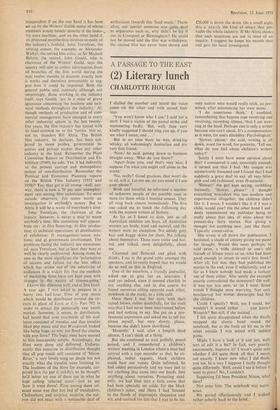A PASSAGE TO THE EAST
(2) Literary lunch
CHARLOTTE HOUGH
I dialled the number and heard the voice come on the other end with mixed feel- ings.
'You won't know who I am,' I said for a start. I was a victim of the postal strike and stammering badly. 'But, well, Jane very kindly suggested I should ring you up, if you see what 1 mean, and ..
But in no time there he was, drinking whisky, all welcomingly Australian and my very first friend.
'Now,' he said, getting down to business straight away, 'Who do you know?'
`Apart from you, and that's very nice, I suppose I'm what you might call alone in the world.'
`No, really? Good gracious, that won't do at all, will it. Let me see, do you mind if I use your phone?'
Brisk and forceful, he informed a number of unknown people of the possible treat in store for them while I blushed unseen. They all rang back almost immediately. The first one asked me to lunch the following day with the women writers of Sydney.
As far as I know to date, just as all Australian children are boys, all Australian women are lively, kind and natural, and the writers were no exception. No untidy grey hair and baggy skirts for them. No talking about themselves. These were svelte and hat- ted, and talked, most delightfully, about me.
Charmed and flattered and plied with drinks, I sat at the grand table amongst the speakers, and fervently hoped that we would do as well as this in England.
One of the members, a friendly journalist, asked me to give her an interview. I said yes indeed, since it seemed churlish to say anything else, and in due course we found ourselves sitting opposite each other, notebook at the ready, in a little café.
Once there I met her eyes, with their raised brows, rather doubtfully, for the truth was that I had never been interviewed before and had nothing to say. She put on a pro- fessional expression and asked me to tell her about myself, but very slowly, please, because she didn't know shorthand.
'Honestly,' I said, after a longish dead silence, 'I can't think of a thing.'
But she continued to wait politely, pencil poised, and I remembered a children's writers' meeting in London where a man had arrived with a tape recorder so that, he ex- plained, rather vaguely, black children could hear our voices. Quite informal, he had added persuasively and we were just to say anything that came into our heads. Just anything about ourselves. Protesting mod- estly, we had filed into a little room that had been specially set aside, for the black children's sakes, and there I had listened to the floods of impromptu eloquence and wit, and realised too late that I was to be the
only author who would really stick, as pro- mised, after announcing her own name.
'I do sometimes think,' I confided. remembering that bygone tape revolving and revolving, recording silence, 'that I am wan- ting in the head. Perhaps one is only a writer because one can't speak. It's a compensation. as it were, for one's disability. Psychological.'
`Slower, please,' she said, writing it all down, word for word, for posterity, 'Tell me. what do you feel about children's writers today?'
Surely I must have some opinion about this? I considered it and, amazingly enough, it turned out that I had. My tongue was mysteriously loosened and I found that I had suddenly a great deal to say, all very blim- pish and old-fashioned, even ill-natured.
`Slower!' the girl kept saying, scribbling furiously, 'Slower, please!' I thought everything nowadays was too modern and experimental altogether, the children didn't like it. I mean, I wouldn't like it if I was a child, would you? On the other hand I sud- denly remembered my publisher being so stuffy about that idea of mine about the present-day fairy stories. Not giving a thought for anything new, just like them. Typically conservative.
She wrote it all down for publication. I hesitated, a shade of anxiety giving me pause for thought. Would this seem perhaps, in cold print, a trifle disloyal to one's old friends of fifteen years or so, who had been good enough to invest in one's first book? After all, fair dos, they had published the stories in the end, even if reluctantly, and as far as I knew nobody had made a fortune out of them either. Also surely the example exactly contradicted the statement? Oh well, it was too late now, so on I went. Some trends 1 thought were worrying. Not only bewildering but worse; downright bad for the children.
Could I specify? Well, yes I could, but wouldn't it sound rather . . . you know? Waspish? But still, if she insisted
I felt quite disappointed when she finally snapped the elastic band round the notebook, but as the fresh air hit me in the street outside I was seized with sudden panic.
Might I have a look at it and just, well. sort of edit it a bit? In fact, very greatly.
enormously, improve it? I wasn't quite surc whether I did quite think all that. I mean. not exactly. I knew now what I did think.
you see, In a way I suppose I really thought quite differently. Well, could I see it before it went to press? No, I couldn't.
Supposing I'd been President Nixon, what then?
Not even him. The notebook was sacro- sanct.
We parted affectionately and I walked rather soberly back to the hotel.


































 Previous page
Previous page